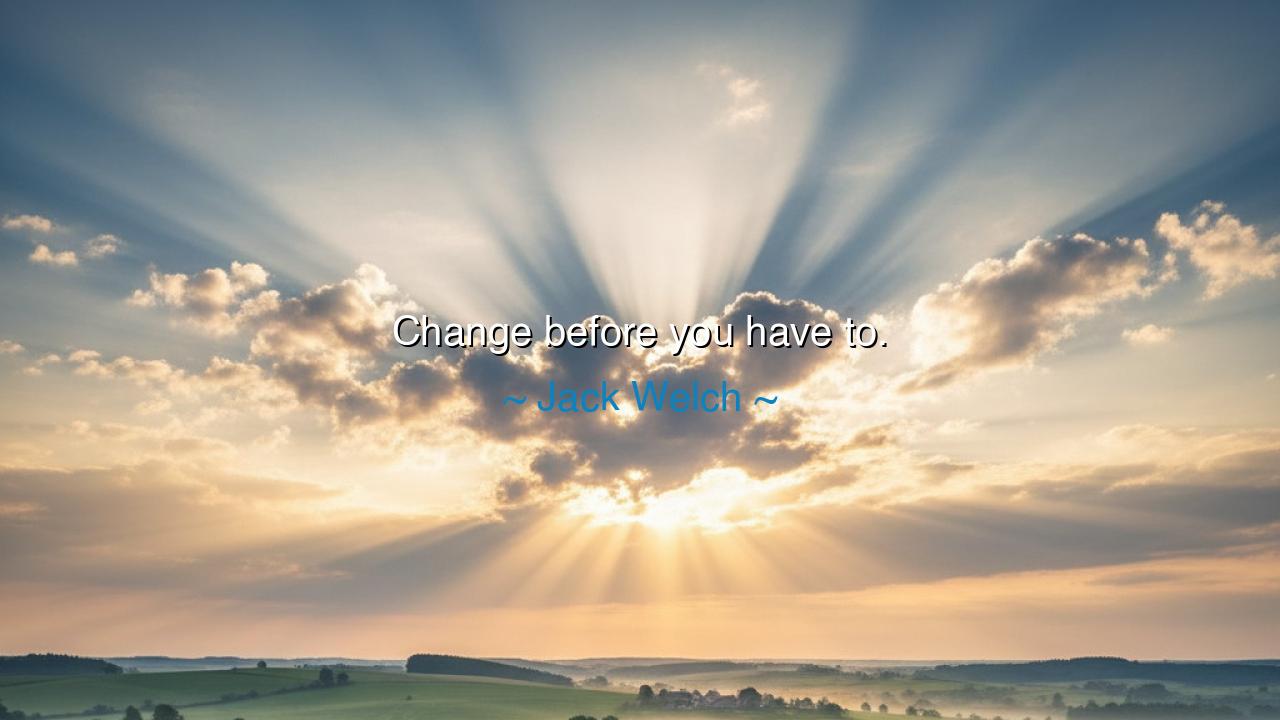
Change before you have to.






Opening Scene
The room is softly lit by the gentle glow of a table lamp, casting warm shadows as the evening draws near. Outside, the city hums quietly, the usual bustle fading into stillness. Jack sits at the table, his hand resting on a notebook, but his mind seems to be somewhere else. Jeeny stands near the window, gazing out at the view below. The mood is calm, yet there’s a sense of anticipation in the air, as though a conversation about change, adaptability, and proactive growth is about to unfold.
Host: After a few moments of silence, Jeeny turns from the window, her voice steady but thoughtful, breaking the quiet.
Jeeny: “I came across a quote by Jack Welch that really made me reflect. He said, ‘Change before you have to.’ It made me think about how often we wait for things to get bad before we make changes. We wait for a crisis, for something to force us into action. But Welch’s point is that anticipating change and making adjustments before things go south can make all the difference. What do you think? Why do you think we often resist change until we’re forced into it?”
Jack: “I think it’s a human thing to resist change, especially when we’re comfortable. The idea of change can feel overwhelming or even threatening, and so we wait until things become unmanageable before we act. But Jack Welch’s quote is a reminder that by making changes proactively — when things are still stable — we can avoid the crisis altogether. Waiting until things get bad can often make it harder to make meaningful changes. If we’re more open to change from the beginning, it can prevent us from reaching a breaking point.”
Jeeny: “Exactly. It’s about being strategic and staying ahead of the curve. The idea that we have to wait until we’re forced into a situation is something we tend to fall into, especially when we feel like we’re managing okay. But the truth is, change is inevitable, and if we embrace it before it’s too late, we can shape it rather than react to it. The key is not waiting for a crisis but being proactive and anticipating the need for change.”
Jack: “Right. And I think part of the reason we resist change is because it’s uncertain. We don’t know how things will turn out, so there’s a natural instinct to hold on to what’s familiar, even if it’s not ideal. But the truth is, when we wait too long, the change becomes much harder to manage. It’s like keeping a leaky faucet running until it bursts — instead of fixing it when you first notice the drip. The sooner we act, the less disruptive the change will be.”
Host: The conversation deepens, and Jeeny moves closer, sitting across from Jack. Her voice steady as she continues.
Jeeny: “And I think it’s also about mindset. When we adopt a mindset that embraces change as a natural part of growth, we can begin to see it as an opportunity rather than a threat. Change doesn’t have to be something that happens only in response to a crisis. It can be something that we actively seek out to improve our lives, our careers, and our businesses. When we see change as part of the process of evolution, we’re less likely to resist it when it comes.”
Jack: “Exactly. Change doesn’t have to be dramatic. It can be small shifts that move us in the right direction. And by making those adjustments early on, we avoid the stress of reacting to something major. Change before you have to means that we take control of our future instead of letting the future control us. If we wait for the world or circumstances to force our hand, we lose that sense of agency.”
Jeeny: “And I think this applies to more than just business or professional situations. It’s about personal growth too. We don’t have to wait until things fall apart emotionally or physically to make a change. By making small, consistent changes toward better habits or healthier mindsets, we avoid hitting rock bottom. We stay ahead of it, and we keep growing.”
Jack: “Exactly. Change isn’t always about fixing something broken. It’s about growth and progress. In business, in our relationships, in our personal lives — staying proactive and adaptable to change can be the difference between thriving and just surviving. It’s all about being willing to evolve, even when things seem fine. When we make change a constant, we avoid waiting for the world to force us into it.”
Host: The room quiets for a moment as Jack and Jeeny reflect on the deeper meaning behind Welch’s words. Outside, the world continues at its usual pace, but inside, there’s a quiet understanding that proactive change is key to staying ahead.
Jeeny: “So, maybe the lesson here is that we need to embrace change before it’s forced upon us. By staying open to growth and anticipating change, we can shape the direction of our lives rather than react to it when things get difficult.”
Jack: “Exactly. Change is inevitable, but by choosing when and how to change, we can guide it in a way that benefits us, rather than letting it take us by surprise when it’s too late.”
Host: As the evening continues, the conversation wraps up with a quiet understanding. Change is a natural part of life, and the more we anticipate and embrace it, the easier it becomes. Proactive change allows us to stay ahead, stay in control, and avoid unnecessary crises. When we change before we have to, we continue to grow, evolve, and move toward a better future.






AAdministratorAdministrator
Welcome, honored guests. Please leave a comment, we will respond soon